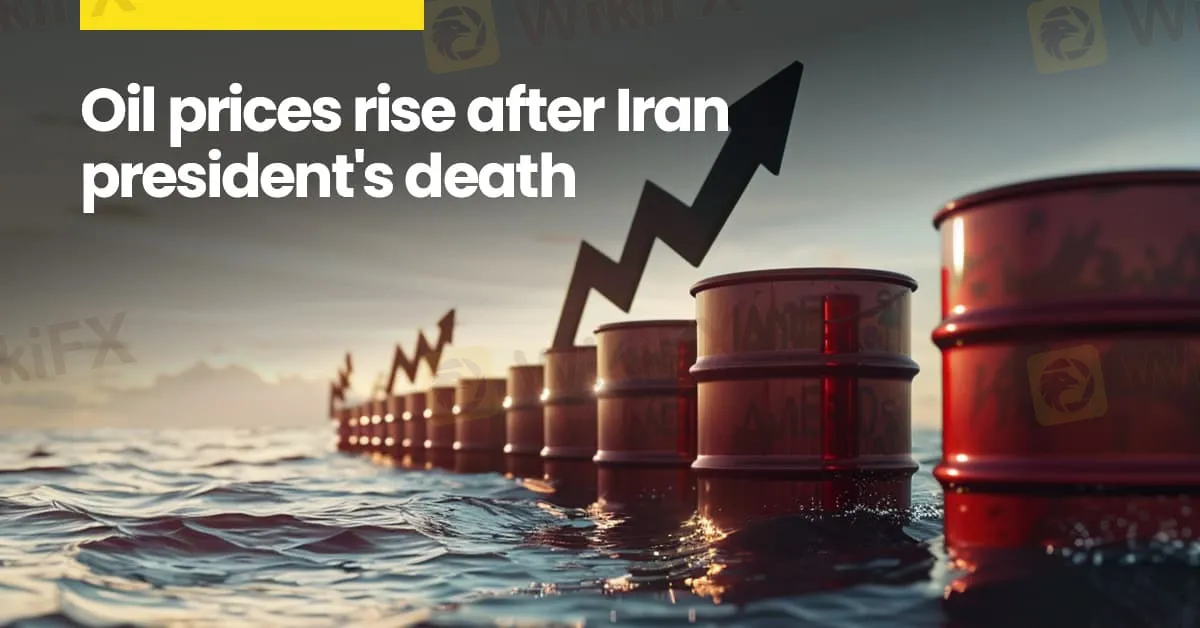简体中文
繁體中文
English
Pусский
日本語
ภาษาไทย
Tiếng Việt
Bahasa Indonesia
Español
हिन्दी
Filippiiniläinen
Français
Deutsch
Português
Türkçe
한국어
العربية
Oil Prices rise after Iran president’s death
Abstract:According to the report, oil prices surged during early Asian trading on Monday, building upon last week's upward momentum. This uptick was driven by multiple factors, including the unfolding search for Iran's president after a helicopter crash in the oil-rich nation and the United States' decision to purchase crude to bolster its national reserves.

According to the report, oil prices surged during early Asian trading on Monday, building upon last week's upward momentum. This uptick was driven by multiple factors, including the unfolding search for Iran's president after a helicopter crash in the oil-rich nation and the United States' decision to purchase crude to bolster its national reserves.
As of 0049 GMT, Brent crude had risen by 26 cents, representing a 0.3 percent increase, reaching $84.24 per barrel. Similarly, U.S. West Texas Intermediate (WTI) crude saw a gain of 15 cents, or 0.2 percent, reaching $80.21 per barrel.
The previous week concluded with Brent crude experiencing a 1 percent uptick, marking its first weekly gain in three weeks. Meanwhile, WTI crude climbed by 2 percent, buoyed by positive economic indicators from both the U.S. and China, the world's largest consumers of oil.
The recent surge in crude oil prices has been underpinned by several factors. Firstly, a helicopter carrying Iranian President Ebrahim Raisi crashed on Sunday, raising concerns about the safety of high-profile figures in the region. Despite this development, the impact on oil prices remained relatively subdued. Additionally, market focus is shifting towards the upcoming meeting of the Organization of the Petroleum Exporting Countries (OPEC) and its allies on June 1, where discussions on output policy are expected to provide clarity to the market.
Warren Patterson, head of commodities strategy at ING, highlighted the current state of the oil market, stating, “The oil market remains largely rangebound, and without any fresh catalyst, we will likely have to wait for clarity around OPEC output policy to break out of this range. The market also appears increasingly numb to developments on the geopolitical front, likely due to the large amount of spare capacity OPEC is sitting on,” as quoted by Reuters.
Meanwhile, seizing the opportunity presented by the recent dip in oil prices, the U.S. government announced its purchase of 3.3 million barrels of oil at $79.38 per barrel to replenish its Strategic Petroleum Reserve, following a significant drawdown from the reserve in 2022.
Last week, market sentiment received a boost from indications of easing inflation in the U.S., which raised expectations of potential interest rate cuts. Such cuts could potentially weaken the dollar, thereby making oil more affordable for holders of other currencies.

Disclaimer:
The views in this article only represent the author's personal views, and do not constitute investment advice on this platform. This platform does not guarantee the accuracy, completeness and timeliness of the information in the article, and will not be liable for any loss caused by the use of or reliance on the information in the article.
Read more

The Impact of Interest Rate Decisions on the Forex Market
Interest rate changes determine currency attractiveness, influencing capital flows and exchange rate trends. Understanding this mechanism helps investors navigate the forex market effectively.

How a Housewife Lost RM288,235 in a Facebook Investment Scam
A 47-year-old housewife in Malaysia recently fell victim to an online investment scam, losing a substantial sum of RM288,235 after engaging with a fraudulent scheme advertised on Facebook.

Interactive Brokers Launches Forecast Contracts in Canada for Market Predictions
Interactive Brokers introduces Forecast Contracts in Canada, enabling investors to trade on economic, political, and climate outcomes. Manage risk with ease.

Bank Negara Malaysia Flags 12 New Companies for Unauthorised Activity
Bank Negara Malaysia (BNM) has updated its Financial Consumer Alert List (FCA List) by adding 12 more entities, reinforcing its efforts to warn the public against unregulated financial schemes. Check if your broker made the list!
WikiFX Broker
Latest News
The Withdrawal Trap: How Scam Brokers Lure Victims into Paying More
FCA to Investors: Think Twice Before Trusting These Brokers
Trump\s tariffs: How could they affect the UK and your money
Trump gambles it all on global tariffs he\s wanted for decades
TradingView Brings Live Market Charts to Telegram Users with New Mini App
Trump tariffs: How will India navigate a world on the brink of a trade war?
Interactive Brokers Launches Forecast Contracts in Canada for Market Predictions
Authorities Alert: MAS Impersonation Scam Hits Singapore
Stocks fall again as Trump tariff jitters continue
IG Group Acquires Freetrade for £160M to Expand UK Investment Market
Currency Calculator







